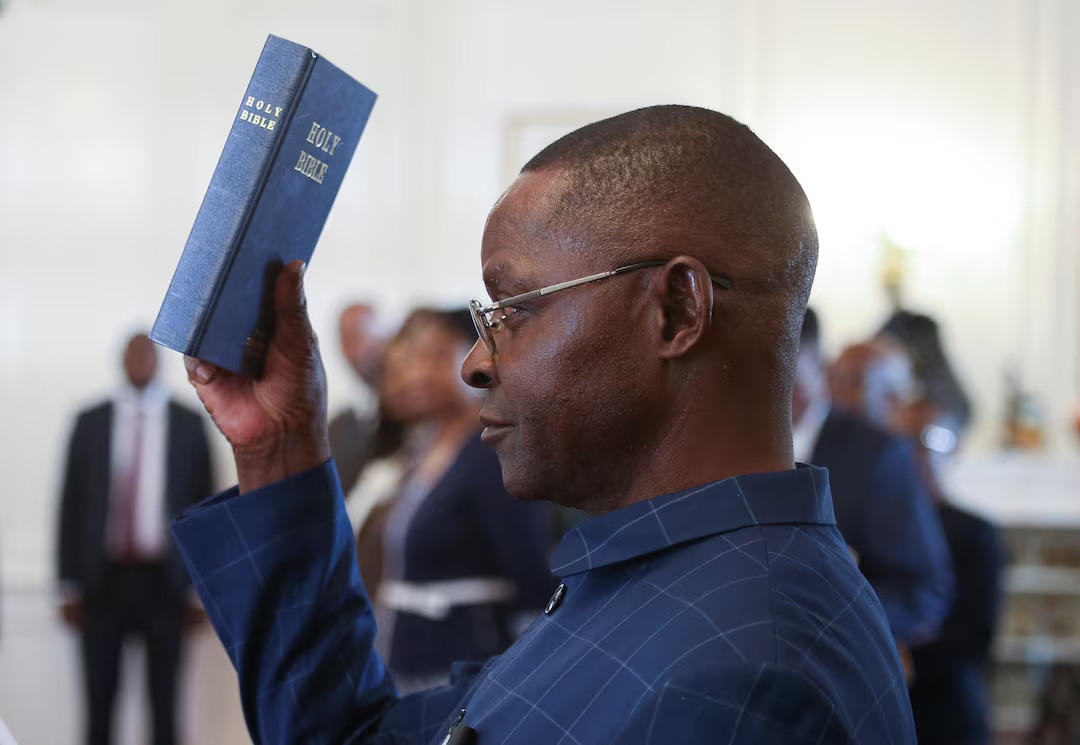By A Correspondent- The state media has deleted a story it wrote in 2016 of Controversial businessman and convicted fraudster, Wicknell Chivayo, offering to help, notorious British mercenary and former SAS officer, Simon Mann, escape prison.
Mann, who once attempted to overthrow the government of Equatorial Guinea and was arrested in Zimbabwe in 2004, returned to Equatorial Guinea.
Mann mentions in his book sharing time behind bars with Zimbabwean businessman Wicknell Chivayo, describing him as “a smart chap.”
A since-deleted Sunday Mail story from 2016 claimed that Chivayo even plotted to organize a hijacked plane to facilitate Mann’s escape—a story that now borders on folklore.
Mann and 69 others were arrested on 7 March 2004 in Zimbabwe when their Boeing 727 was seized by security forces during a stop-off at Harare’s airport to be loaded with £100,000 worth of weapons and equipment.
This was the same time Chivayo was serving his fraud jail term.
The Internantional terrorist died last at the age of 72.
Mann reportedly collapsed while exercising—an anticlimactic end for a man whose life was spent navigating the murky intersection of power, money, and militarism.
After his service in the British army, Mann co-founded Sandline International with fellow ex-Colonel Tim Spicer in 1996.
The private military company operated extensively in conflict zones such as Angola and Sierra Leone.
However, Sandline’s dealings weren’t always subtle.
Their contract in Papua New Guinea, which triggered the infamous Sandline Affair, exposed the emerging business of privatized warfare and the deep entanglements between Western interests and fragile post-colonial states.
Mann’s name became permanently etched in African history with the 2004 “Wonga Coup”, a daring plan to overthrow Teodoro Obiang Nguema, the long-ruling dictator of Equatorial Guinea.
The plan was as bold as it was reckless—an attempted coup financed by powerful interests, including Mark Thatcher, son of the late British Prime Minister Margaret Thatcher.
The plot aimed to install exiled politician Severo Moto Nsá as president in place of Nguema.
But fate, or perhaps hubris, led the conspirators to make a fatal logistical stop in Harare, Zimbabwe, to refuel their Boeing 727 and collect arms bought from Zimbabwe Defence Industries.
That decision changed everything.
Zimbabwe’s intelligence services under President Robert Mugabe, then at the height of his power, were swift and merciless.
Mann and 64 mercenaries—largely veterans of South Africa’s apartheid-era 32 Buffalo Battalion—were arrested before they could leave the tarmac.
The same intelligence machine that once violently suppressed domestic dissent—through abductions, torture, and surveillance—was remarkably alert and effective when it came to defending allies and interests abroad.
This operation became a feather in Mugabe’s cap. His intervention not only cemented a political alliance with Obiang Nguema—who has now ruled Equatorial Guinea since 1979—but also demonstrated the reach and efficiency of Zimbabwe’s secret services when defending the regime’s foreign policy interests.
Unfortunately, this same intelligence structure has historically been used to crush internal opposition and civil liberties at home, treating critical citizens not as compatriots but as enemies of the state.
Mann was sentenced to prison in Zimbabwe, where he was held at Chikurubi Maximum Security Prison before being extradited to Black Beach Prison in Equatorial Guinea, a facility notorious for torture and inhumane conditions.
Though the coup was thwarted its consequences continue to ripple through Zimbabwe’s foreign policy.
When Obiang Nguema was inaugurated for yet another seven-year term in December 2022, President Emmerson Mnangagwa was the only Southern African leader in attendance. Zimbabwe’s relationship with Equatorial Guinea remains unusually warm—thanks in large part to Mugabe’s timely intervention in 2004.
The Zimbabwean government was even gifted a luxurious mansion in Malabo, a diplomatic token that must now be protected from those known to convert state resources into personal assets.
The irony, of course, is not lost. Mugabe, who once spoke of democracy and liberation, presided over one of Africa’s most repressive intelligence networks—skilled at monitoring citizens, abducting activists, and crushing dissent.
While his spies acted swiftly to protect Obiang from mercenaries, they remained complicit in the systemic persecution of journalists, students, and opposition figures in Zimbabwe.
Interestingly, Obiang himself rose to power by executing his own uncle, the tyrannical Francisco Macías Nguema, in 1979.
Macías ruled Equatorial Guinea with brutal cruelty—so much so that, by comparison, even Mugabe’s own legacy of political violence and repression seems modest.
As some have said, “Mugabe couldn’t qualify to tie Macías’ shoes when it comes to diabolic politics.”
And yet, the difference may be in method, not intention.
Mugabe’s intelligence state was as paranoid as it was brutal—obsessed with controlling not just power, but truth itself.
For those who dared oppose the regime, Zimbabwe was and still is a place where the walls had ears, and the price of dissent was/is often paid in blood.
Like this:
Like Loading...



























































































